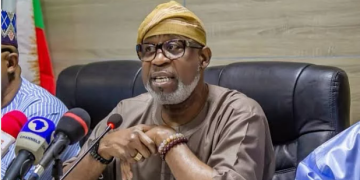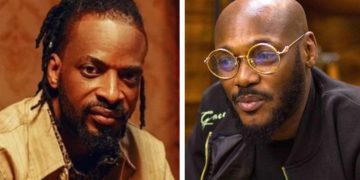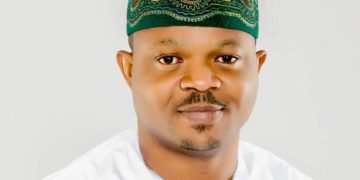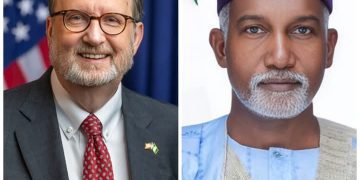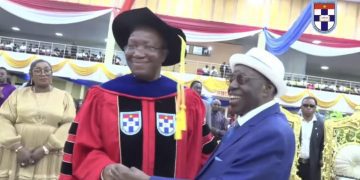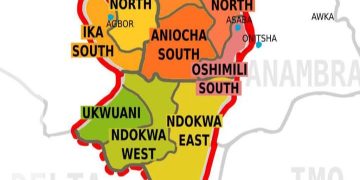I can only call the attention of Mr. President to the saying of his people. When danger approaches you facewards, Yoruba say, shoot your shot; when it turns its backside, aim your shot; but when you find yourself all alone, reconsider your stand
By Festus Adedayo
I have read enough works on the phenomenon of sycophancy in politics to know that it is a democratic curse. Whenever I reflect on its curse on development, my mind hovers over a character called Abulu in Akure, Ondo State-born Chigozie Obioma’s The Fishermen (2015). A fictional book that got the shortlist of The Booker Prize, in it, four well-brought-up kids of same parents, in the city of Akure, where the tragic plot was set, capitalize on a parental lacuna of their father’s absence to manifest traits of truancy and tantrums of youth.
On one of those fishing expeditions, the truant children encounter Abulu, a madman gifted with prescient ability of prophetic pronouncements. All of a sudden, curses/prophecy waft off Abulu’s mouth. It was to Ikena, one of the brothers. Incidentally, for the ostensible reason of averting Abulu curse of its Omo awùsá – walnut pod-like splinter, last week, Southwest Nigerian leaders met for two days in Abulu’s Akure. On the table was a single agenda: to pursue regional integration and foster prosperity across the six states that make up Yorubaland. Ever since the passage of Obafemi Awolowo in 1987, a man the tribe vested with all the attributes of an ancestor, the tribe has orbited aimlessly without a rudder.
Awolowo himself acknowledged the shortcomings of his people — they were a sophisticated but self-warring tribe who needed an anchor. Like an Abulu curse, after Awo’s death, metaphorically, Yoruba returned to the centuries before him when inter-tribal wars like the Ijaiye, Ekitiparapo, Kiriji and allied wars were waged among themselves.
While unity was the overt reason for the Akure gathering, its integral but hidden essence was to garner support for the second term ambition of their son, Bola Ahmed Tinubu. The summiteers never met to pressure Tinubu for foods on the table of their people but to sing his panegyrics like a self-serving griot. Already, like the local magician of the 1970/80s Nigeria, their son has almost expended all his talismanic wiles, pulling claps-inducing stunts to sustain himself in power. Realizing that the Samia Suluhu Hassan of Tanzania stunt of banning political party leaders and jailing them to remain the numero-uno presidential candidate would spark off Armageddon in Nigeria, ours made a detour to Italian philosopher, Antonio Gramsci.
In his Prison Notes, Gramsci taught Tinubu the way to go. Gramsci’s main teaching is that, rather than the foolish coercion currently sparking hell in Tanzania, a leader could secretly maintain dominance of his people through subterfuge. Having arrested the hearts of governors without firing a single bullet, castrating political parties without any noticeable groan, getting a deranged drunk political ally to clear a political party path for him, and a pliable judge to render the dream of a viable opposition political party a mirage, the next shot to fire was to guard against an Olusegun Obasanjo political shame.
So, to Abulu’s Akure, the president’s appointees came. The unspoken intent of the summit was to clone an Awolowo cultic following for the president and probably recreate his mystique. Garlands and deodorizers hung in the sky. Speaker after speaker beatified what they called the Tinubu exploits of the last months. Even their host, Lucky Aiyedatiwa, in his moment of unprovoked sycophancy, pronounced that re-electing the president had become an executive order. Whatever that balderdash means. They all spoke of the need for Yoruba to speak with a unified voice.
If you ask me, that summit should have appropriately been themed Idíbèbèrè. If well articulated and postulated, the idíbèbèrè as a philosophy is sycophancy. Woven into a common adage, the Yoruba say, Omo eni kò ní í ṣe dí bèbèrè ká fi ilèkè sí dí omo elòmíràn. Literally, the saying means one’s child’s buttocks deserve the waist beads ahead of someone else’s, no matter how beautifully configured the other buttocks may be to securely hold the beads. As a philosophy, it does not brew dissent nor compromise.
Steven Levitsky and Daniel Ziblatt have spoken extensively on what kills democracies. In their 2018 book, How Democracies Die, these two Harvard University political scientists drilled deep down into how elected leaders gradually subvert democracies. But they obviously didn’t reckon with sycophancy as a cancer strain that kills democracy.
So, I remember an event which took place about 15 years ago. We were all inside a politician’s office that torrid afternoon. My host was a man who had made good in his chosen career and had enough bucks to splash on politics. As at that time, he was angling to govern Oyo State and desired my professional communication experience. And there I was.
Tinubu can still be the greatest president of Nigeria ever if he avoids the Pharisees and Sadducees of Yorubaland. They are the parasitic sycophants who shout, as the people of Tyre and Sidon shouted to King Herod Agrippa I, “This is the voice of a god, and not of a man!” But what happened to Agrippa?
I return to the tale of 15 years ago. Politicians of all shades and colour were in a semi-festive mood. The atmosphere borrowed a leaf from the ancient saying that, at the fall of the elephant, diverse types of knives surface to pay obeisance to a naked flesh. Upstairs, occupying virtually all the chairs in the room, I belonged to that crowd seated like a congested mass of humanity. But the theatrics of the politicians had me gasping for breath. One of them walked up to our host, the man who would be governor.
As he stood before him, he flashed him a smile which instantly worked like a talisman. “Your Excellency,” he began, in adoration of a man who was neither excellent nor possessed a capacity to excel in his newfound quest to become governor. Then, he helped him adjust his cap, patented after Yoruba’s recent ancestor, Obafemi Awolowo’s. And from nowhere, the politician dropped the innocuous bombshell.
“Do you know that the way you tilted your cap was the same way Baba Layinka used to wear his cap?”
Baba Layinka was the affectionate and affable name given Chief Awolowo. During the 1959 federal election rallies in Lagos, chants of “Awolowo, Baba Layinka, yio se b’otiwi!” meaning, “Awolowo, the father of Layinka, he will keep his word!” rent the air. The man who would be governor grinned from ear to ear like a cow headed for the abattoir. That day, I knew the deadliness of sycophancy and the danger it portends for democratic governance. Though I encountered sycophancy in my stints with politicians, that day in Molete, I encountered it in its rawest form. My earlier stint in government, which weaned me off the prudery of theories of Nigerian politics, showed me that Nigerian politicians derive unspeakable joy, excitement and satisfaction from praises and flattery.
The good thing about the Yoruba is that their espousal of that genuflection to tribe philosophy of idíbèbèrè does not stop them from telling themselves hard, harsh truth. So they say, upon emerging from a house where they hitherto locked themselves, a mutual smile of two brothers equals self-deception while a frown approximates exchange of hurtful truth. This is what will necessitate the submissions underleaf. To begin with, permit me to dwell on three leaders at the summit and their perceptions of the Yoruba current reality.
Baba Reuben Fasoranti began his speech with obeisance to two ecumenical spirits — Oduduwa, Yoruba’s progenitor and, in his words, “in the wisdom of our Sage, Chief Obafemi Awolowo, and in the hope of generations yet unborn.” He called on Yoruba to be blind to political parties but the ideals of the Yoruba nation. Bishop Ayo Ladigbolu told the summiteers the plain truth we have failed to appropriate since 1987 when Awolowo transited mortality for immortality. It is that, the race may never succeed in recreating another Awolowo.
Chief Bisi Akande’s was a departure from the two. Like a mail-boy, he literally bore a mail from his master and benefactor, the president. After boring the crowd with his prosaic “economy is being re-engineered through tax reform” bla-bla-bla, he proselytized on what he called “Quiet restructuring.” This was a man who, in a media interview on August 2020 signature of ‘see no evil do evil’ defence of the Muhammadu Buhari government, said he was not aware that APC wrote restructuring in its manifesto. Now when it is time to defend his master’s pot of soup, knowing that ‘restructuring’ is one electrifying byword that arrests the consciousness of an average southerner, it was time to appeal to base sentiments for votes.
Some hurtful realities need to be confronted. One is that — let us pardon the younger elements gathered for the summit — among the elders in Akure, who is/was an Awoist? Baba Fasoranti was and is; Femi Okurounmu was and is but Bisi Akande is a self-confessed NCNCer, otherwise known as demo in Yoruba First Republic politics. By his own account, he was brought into the UPN by Chief S.M. Afolabi. He still carries the gene of anti-progressivism in his blood. Secondly, since our president began his politics, where has anyone heard him mouth the name ‘Awolowo’ or pay him tribute? Tinubu’s lifelong ambition, like Olusegun Obasanjo’s, has always been for the Yoruba to erase the name ‘Awo’ from their lips and supplant it with theirs. They remind me of Awolowo’s account in his book about how S. L. Akintola had assured his wife, Faderera, at the coronation of Oba Sikiru Adetona on April 2, 1960, that in six months, she would never hear the name Awo in the western region. Didn’t Awo triumph over them?
As the summiteers prepared to leave Akure, did they hear the voice of Abulu? It may be hurtful but it is the truth: Unless the present government takes off its garment of excessive Yorubanization, either real or imagined, it is digging the Yoruba’s grave. This is more especially for those same “hope of generations yet unborn” whom Baba Fasoranti referenced.
Abulu’s curses may not stick on the Yoruba only if, after Tinubu’s exit from government, the race goes out of Nigeria into its mythic Oduduwa Republic. Otherwise, by 2031, the Yoruba will realize the essence of that ancient saying that, “ohun tí í tan ni egungun odun, omo Alagbaa nbo waf’ akara je’ko.” Broken into its chewable granular, the wisdom in the above Yoruba saying is that, during the Yoruba masquerade festive season, it is usually all sumptuous for children of the Chief Masquerade. However, off season, like everyone else, in contemporary argot, Alagbaa’s children would also “eat breakfast.”
When the Yoruba may have left Aso Rock in 2031, Tinubu stands the risk of becoming our own Aguiyi Ironsi and Odumegwu Ojukwu rolled into one. Recollect that the ostracism Igbo people suffer in the hands of the Nigerian state today is borne out of the Unification Decree Ironsi promulgated and Ojukwu’s preferencing of his people beyond a punishing Nigeria.
If that happens to the children of Oduduwa and Awolowo, by 2031, the rest of Nigeria would then exchange the Yoruba race the Igbo, on account of perceived Tinubu’s attempt to preference his Yoruba people against the rest of Nigeria. In reality though, that perceived preferencing by Tinubu is for his Lagos political acolytes who happen to be Yoruba. While Yoruba must put its house in order, it cannot discount association with other tribes. Right now, western Nigeria has nil federal presence, yet it has courted huge hatred from its ilk. Yoruba leaders can only move Yorubaland forward and ensure the success of Tinubu, not by the kind of rank sycophancy exhibited at that Akure summit, but by telling him the acrid truth that may foul up his tongue.
I can only call the attention of Mr. President to the saying of his people. When danger approaches you facewards, Yoruba say, shoot your shot; when it turns its backside, aim your shot; but when you find yourself all alone, reconsider your stand. Tinubu can still be the greatest president of Nigeria ever if he avoids the Pharisees and Sadducees of Yorubaland. They are the parasitic sycophants who shout, as the people of Tyre and Sidon shouted to King Herod Agrippa I, “This is the voice of a god, and not of a man!” But what happened to Agrippa?
•Opinions, positions or thoughts expressed here are personal and strictly of the writer/author and do not represent the views of The Daily Crucible.




